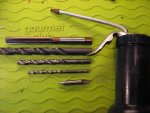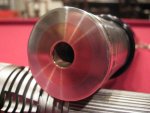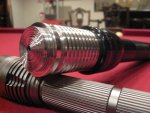- Joined
- Jul 4, 2008
- Messages
- 2,499
- Points
- 113
I am just trying to find a drill bit that would make a decent fit for a 12mm dia copper module.
I have found 31/64 ( actually 0.4844") as being the closest drill bit to 12mm
12mm translates into 0.472"
What are you using to machine heatsinks? :thinking:
This question is aimed directly at metalworkers!
:can:
Thanks
I have found 31/64 ( actually 0.4844") as being the closest drill bit to 12mm
12mm translates into 0.472"
What are you using to machine heatsinks? :thinking:
This question is aimed directly at metalworkers!
:can:
Thanks







